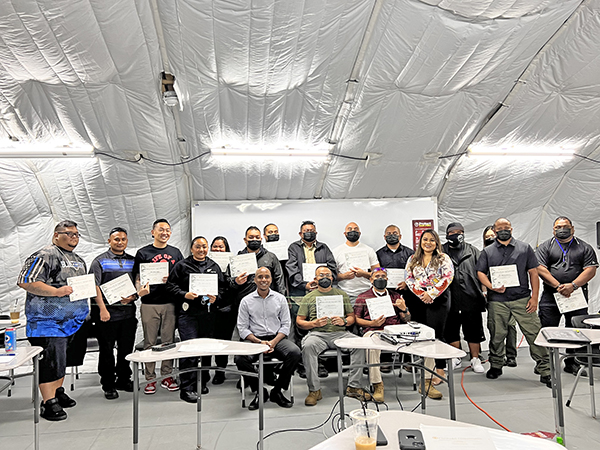Cannabis enforcement training begins for law enforcers

CNMI Cannabis Commission managing director Monique Sablan, fifth from right, and Office of the Attorney General Criminal Division Chief Prosecutor Chester Hinds, seated left, pose with Department of Public Safety officers and their supervisors after two training sessions at the Northern Marianas College last week. (Kimberly B. Esmores))
After over a year since the recreational and medicinal use of cannabis was made legal in the CNMI, the CNMI Cannabis Commission, in collaboration with the Office of the Attorney General Criminal Division, held a two-day enforcement training to clarify the dos and don’ts for legal cannabis users.
Cannabis commission managing director Monique Sablan said this series of trainings is important because for there had been a gray area in terms of who’s enforcing what when it comes to marijuana rules and regulations
“The relationship between the commission and law enforcement agencies, it’s been a little bit of a gray area. A lot of us were not sure at one point of what was the relationship like who’s enforcing what, who’s going to enforce the businesses, who’s enforcing marijuana out in the community. Now, this training is to establish our relationship and what our goals are for this industry,” Sablan said
The first two training sessions, which were conducted last Thursday and Friday at the Northern Marianas College, were geared for Department of Public Safety officers and their supervisors.
“We’re starting off first with DPS, our front-liners, and their supervisors. What we’re trying to do is to give them the information not only through the commission, but through legal advice, with Chief Prosecutor Chester Hinds,” she said.
With DPS officers having received this training, the commission now aims to hold similar trainings for Customs and Border Patrol, Department of Corrections, Department of Fire and Emergency Medical Services, and possibly even the Alcoholic Beverage and Tobacco Control Bureau.
“Next month, we’re actually going to focus more on Customs. There’s a lot of different questions for Customs too, a lot of the information within the law that we want to break down for them in regards to what their duties are. Then we’re going to move on to DOC and hopefully DFEMS as well, then finally smaller law enforcement agencies such as ABTC because they also play a part in enforcement in stores. We want to be able to encompass all of that. So hopefully, within the next few months, we’re also going to be planning our trip in May, hopefully to Tinian and Rota,” she said.
“We’re trying to do all of this within the span of maybe two to three months. The beauty of having these trainings where we only have about 20 participants from a specific division is really helpful because they have their own questions in relation to their jobs and we’re able to answer those questions. By doing this, we’re not wasting anyone’s time. We’re getting down to the nitty gritty of what are they are supposed to do,” Sablan added.
According to Hinds, OAG Criminal Division chief prosecutor, the hope is to establish a relationship between the commission and enforcement agencies like DPS so that everyone is aware of the line between right and wrong when it comes to this new industry.
“Having these agencies be on the same page is important because we want the marijuana industry in the community to flourish. We want it to flourish legally because if it’s flourishing legally, that means it can contribute to the economy. Also, with due training and education means less work later, and less people getting in trouble over marijuana. Lastly, we want to focus on kids not smoking marijuana too. So that’s why it’s important that DPS understands where the line is,” he said.























